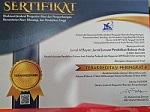Utilization of Wordwall Media in Arabic Vocabulary Learning Towards Eighth Graders
Abstract
Wordwall is an interesting, interactive, and educational browser game application. This application can be an interesting learning resource, media, and assessment tool for students. This research aims to determine the application of Wordwall media and determine students' responses to learning Arabic vocabulary using Wordwall media in eighth grade at MTs Satu Atap Al-Hidayah Batu. A quantitative approach and survey methods were used in this research. Data collection was carried out through observation, interviews, and questionnaires. The data collected was eventually analyzed by using descriptive statistics. Descriptive analysis was carried out with the SPSS 25 application. The research results showed that the ideal total score for all items is the number of questionnaires 9 X Maximum score 18 for each score = 162. The total score obtained from the research = 116. The students’ responses about Wordwall media as a learning media for Arabic vocabulary are considered positive because the percentage value obtained is 71.60%. It was confirmed that the significance of Wordwall as an innovative learning tool and the positive response from students, providing a basis for increasing the use of technology in educational contexts.
Keywords
Full Text:
PDFReferences
Aidah, Nur, and Nurafni Nurafni. “Analisis Penggunaan Aplikasi Wordwall pada Pembelajaran IPA Kelas IV di SDN Ciracas 05 Pagi.” Pionir: Jurnal Pendidikan 11, no. 2 (2022).
Alterkawi, Kenda. "Allughat Alearabiat Bayn Alhujat Altaelimiat Walmumarasat Aleamaliat fi Kuliyat Aleulum Al'iislamiat Lijamieat Bartin." Bartin Universitesi Islami Ilimler Fakultesi Dergisi 19 (2023): 48-72.
Balakrishnan, Sai, and Ann Forsyth. “Qualitative Methods.” The Routledge Handbook of International Planning Education. Routledge (2019): 145-161.
Fakhruddin, Abdul Aziz, Mochammad Firdaus, and Lailatul Mauludiyah. “Wordwall Application as a Media to Improve Arabic Vocabulary Mastery of Junior High School Students.” Arabiyatuna: Jurnal Bahasa Arab 5, no. 2 (2021): 217.
Fitrah, Muh. Metodologi Penelitian: Penelitian Kualitatif, Tindakan Kelas & Studi Kasus. CV Jejak (Jejak Publisher). 2018.
Hafizah, Nurul. “Media Pembelajaran Digital Generasi Alpha Era Society 5.0 pada Kurikulum Merdeka.” Al-Madrasah: Jurnal Pendidikan Madrasah Ibtidaiyah 7, no. 4 (2023): 1675-1688.
Hamdayama, Jumanta. Metodologi Pengajaran. Jakarta: PT Bumi Aksara. 2022.
Hartatiningsih, Dwi. “Meningkatkan Penguasaan Vocabulary Bahasa Inggris Dengan Menggunakan Media Wordwall Siswa Kelas VII MTs. Guppi Kresnomulyo.” Action: Jurnal Inovasi Penelitian Tindakan Kelas dan Sekolah 2, no. 3 (2022): 303–312.
Iivari, Netta, Sumita Sharma, and Leena Venta-Olkkonen. “Digital Transformation of Everyday Life–How COVID-19 Pandemic Transformed the Basic Education of the Young Generation and Why Information Management Research Should Care?” International Journal of Information Management 55 (2020): 102183.
Imanulhaq, Rela, and Andi Pratowo. “Edugame Wordwall: Inovasi Pembelajaran Matematika di Madrasah Ibtidaiyah.” Jurnal Pedagogos: Jurnal Pendidikan 4, no. 1 (2022): 33–41.
Lyanda, Doli, RM Nasrul Halim, and Firamon Syakti. “Media Pembelajaran Animasi 3D Sistem Tata Surya Menggunakan Metode Addie.” Jurnal Teknologi dan Sistem Informasi Bisnis 5, no. 4 (2023): 528-533.
Mertha, I Wayan, and M Mahfud. “History Learning Based on Wordwall Applications to Improve Student Learning Results Class X IPS in Ma As’adiyah Ketapang.” International Journal of Educational Review, Law and Social Sciences (IJERLAS) 2, no. 5 (2022): 507-612.
Muwaffaq, Abdulloh, and Lilik Mawartiningsih. “Pengembangan Media Pembelajaran Macromedia Flash 8 Berbasis Pendekatan Konsep.” Proceeding Biology Education Conference: Biology, Science, Enviromental, and Learning 15, no. 1 (2017).
Nasution, Rizky Amalia, Amrin Fauzi, and Arlina Nurbaity Lubis. “The Effect of Customer Co-Creation and Customer Experience on Electronic Word of Mouth (EWoM) through Customer Satisfaction on Sharia Indonesian Bank in Medan City.” International Journal of Economic, Business, Accounting, Agriculture Management and Sharia Administration (Ijebas) 3, no. 1 (2023): 296-309.
Pradana, Fajar, Punaji Setyosari, Saida Ulfa, and Tsukasa Hirashima. “Development of Gamification-Based E-Learning on Web Design Topic.” International Journal of Interactive Mobile Technologies 17, no. 3 (2023): 21–38.
Purnaningsih, Pari. “Strategi Pemanfaatan Media Audio Visual untuk Peningkatan Hasil Belajar Bahasa Inggris.” Jurnal Informatika Universitas Pamulang 2, no. 1 (2017): 34-41.
Rodriguez-Escobar, Claudia, Juan Cuevas-Lepe, and Lorena Maluenda-Parraguez. "Assessing the Effectiveness of Wordwall. Net as a Vocabulary Learning Tool: Pre-Service EFL Teachers’ Perspectives." (2023).
Rohmawati, Afifatu. “Efektivitas Pembelajaran.” Jurnal Pendidikan Usia Dini 9, no. 1 (2015): 15-32.
Saleh, M. Sahib, and Sunandar Sakria Malinta. “Survei Minat Belajar Siswa dalam Mengikuti Pembelajaran Pendidikan Jasmani di SMPN 30 Makassar.” Kinestetik 4, no. 1 (2020): 55–62.
Sarie, Fatma, I Nyoman Tri Sutaguna, I Putu Suiraoka, Darwin Damanik, Gusnita Efrina, Rahmahidayati Sari, Ayu Rahma Nengsi, Fadli Agus Triansyah, and Talitha Wenifrida Massenga. Metodelogi Penelitian. Batam: Cendikia Mulia Mandiri. 2023.
Shabrina, Friza, and Wahyu Taufiq. “The Effect of Teaching English Vocabulary on Junior High School Students by Using Wordwall. net," Borneo Educational Journal (Borju) 5, no.2 (2023): 283-295.
Silvia, Komang Sella, and I Dewa Gede Firstia Wirabrata. “Meningkatkan Kosakata Anak Usia Dini Melalui Media Wordwall.” Jurnal Pendidikan Anak Usia Dini Undiksha 9, no. 2 (2021): 261-269.
Susanto, Edy, and Meilida Eka Sari. “Effectiveness of Using the Wordwall Application on Student Learning Outcomes.” At-Ta’lim: Media Informasi Pendidikan Islam 22, no. 1 (2023): 127-133.
Vamathevan, Jessica, Dominic Clark, Paul Czodrowski, Ian Dunham, Edgardo Ferran, George Lee, Bin Li, Anant Madabhushi, Parantu Shah, Michaela Spitzer, and Shanrong Zhao. “Applications of Machine Learning in Drug Discovery and Development.” Nature reviews Drug discovery 18, no. 6 (2019): 463-477.
DOI: http://dx.doi.org/10.24042/albayan.v16i1.20451
Refbacks
- There are currently no refbacks.
Copyright (c) 2024 Jurnal Al Bayan: Jurnal Jurusan Pendidikan Bahasa Arab
License URL: https://creativecommons.org/licenses/by-nc-sa/4.0
Editorial Office:
Jurnal Al Bayan: Jurnal Jurusan Pendidikan Bahasa Arab, Arabic Education Study Program, Faculty of Education and Teachers Training, Unversitas Islam Negeri Raden Intan Lampung
Jl. Endro Suratmin 1 Sukarame, Bandar Lampung 35131-Indonesia
e-mail: jurnalalbayan@radenintan.ac.id
http://ejournal.radenintan.ac.id/index.php/albayan/index
Jurnal Al Bayan: Jurnal Jurusan Pendidikan Bahasa Arab is licensed under a Creative Commons Attribution-ShareAlike 4.0 International License. p-ISSN 2086-9282 | e-ISSN 2549-1229









